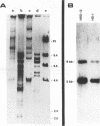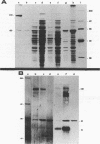Abstract
A 4.0-kb BamHI-HindIII fragment encoding the cryIIA operon from the NRD-12 isolate of Bacillus thuringiensis subsp. kurstaki was cloned into Escherichia coli. The nucleotide sequence of the 2.2-kb AccI-HindIII fragment containing the NRD-12 cryIIA gene was identical to the HD-1 and HD-263 cryIIA gene sequences. Expression of cryIIA and subsequent purification of CryIIA inclusion bodies resulted in a protein with insecticidal activity against Heliothis virescens, Trichoplusia ni, and Culex quinquefasciatus but not Spodoptera exigua. The 4.0-kb BamII-HindIII fragment encoding the cryIIA operon was inserted into the B. thuringiensis-E. coli shuttle vector pHT3101 (pMAU1). pMAU1 was used to transform an acrystalliferous HD-1 strain of B. thuringiensis subsp. kurstaki and a leaf-colonizing strain of B. cereus (BT-8) by using electroporation. Spore-crystal mixtures from both transformed strains were toxic to H. virescens and T. ni but not Helicoverpa zea or S. exigua.
Full text
PDF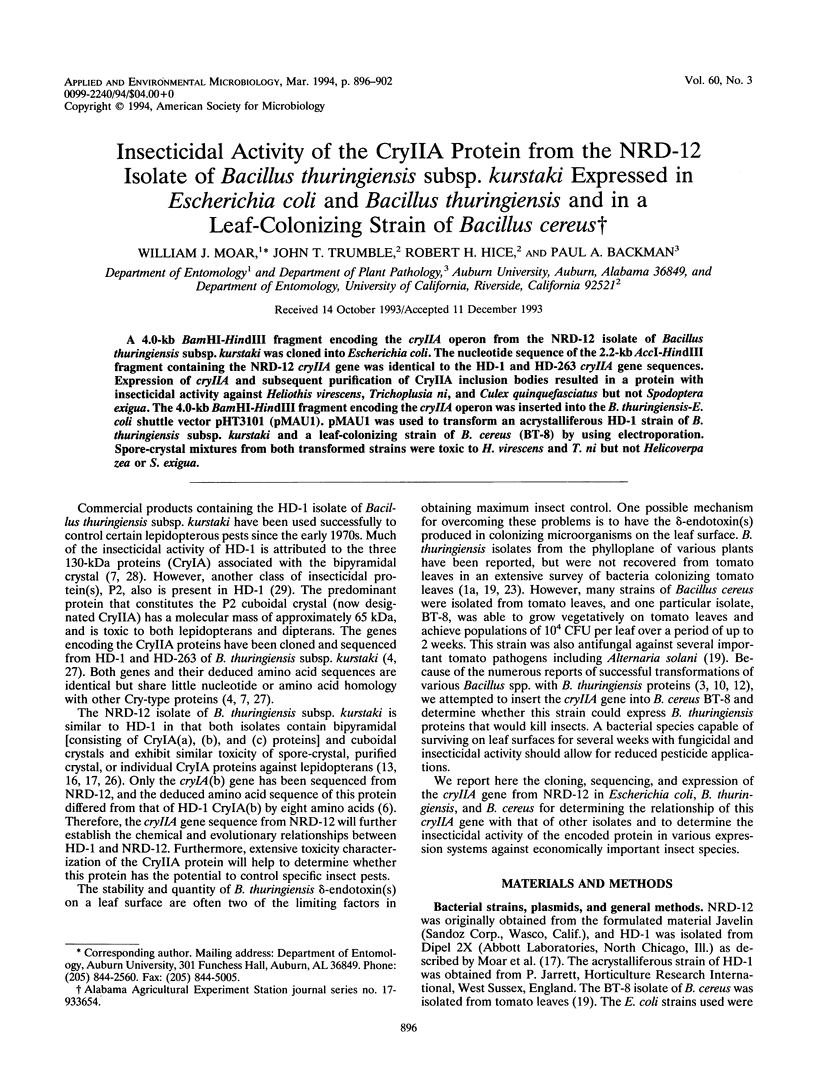
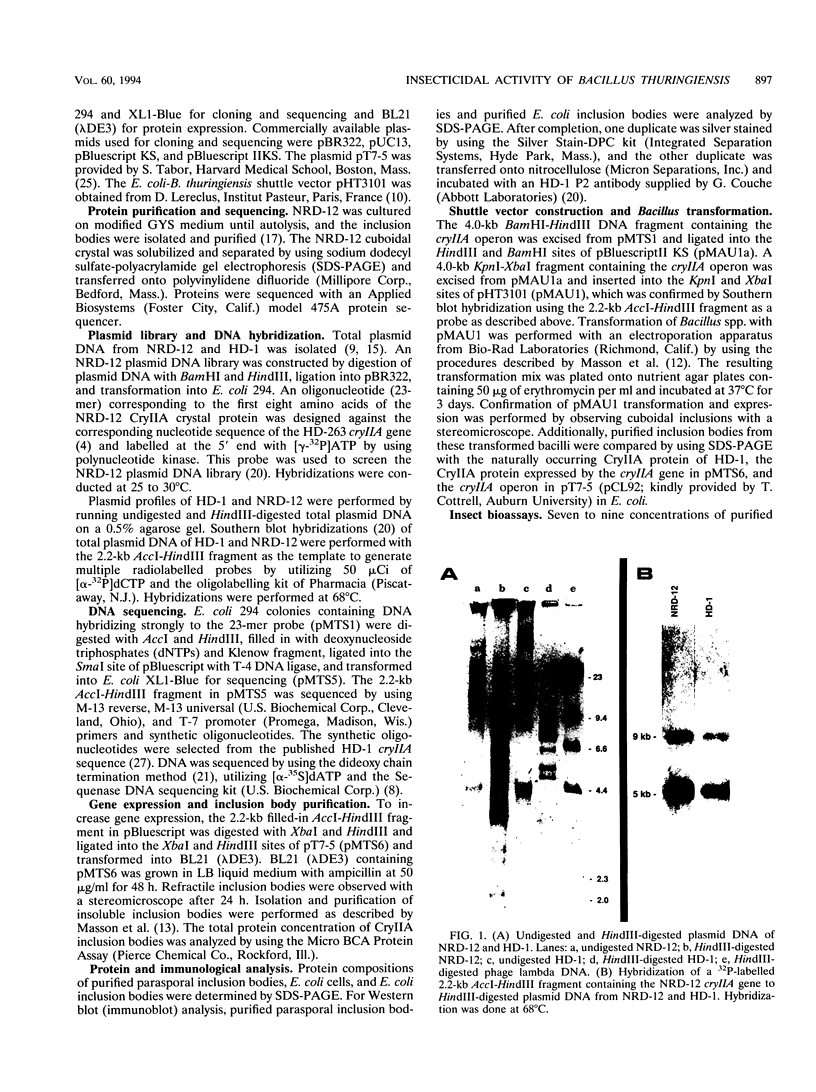
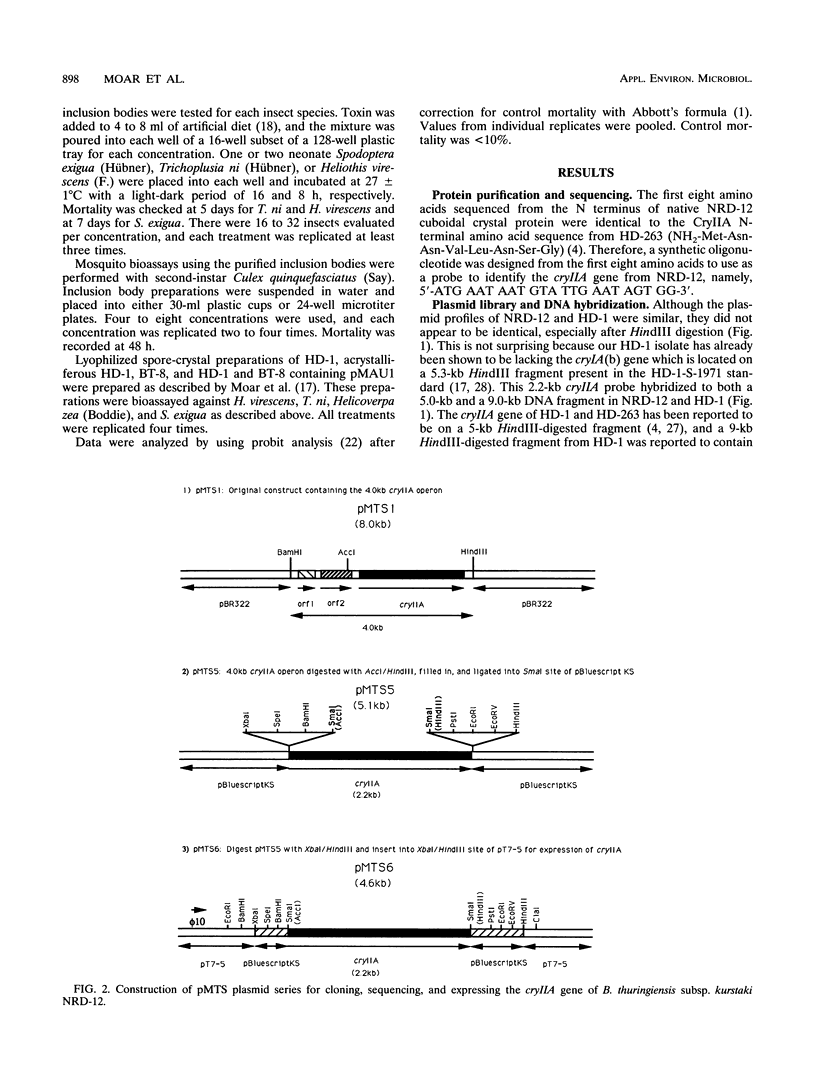
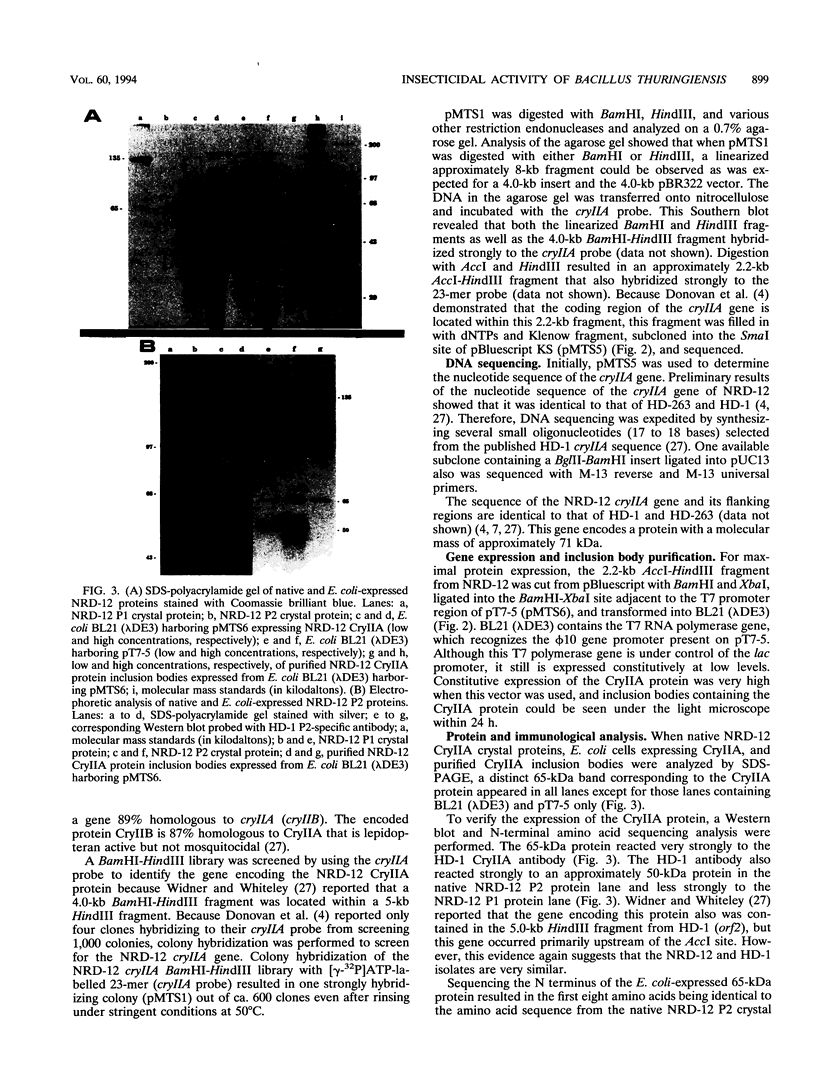
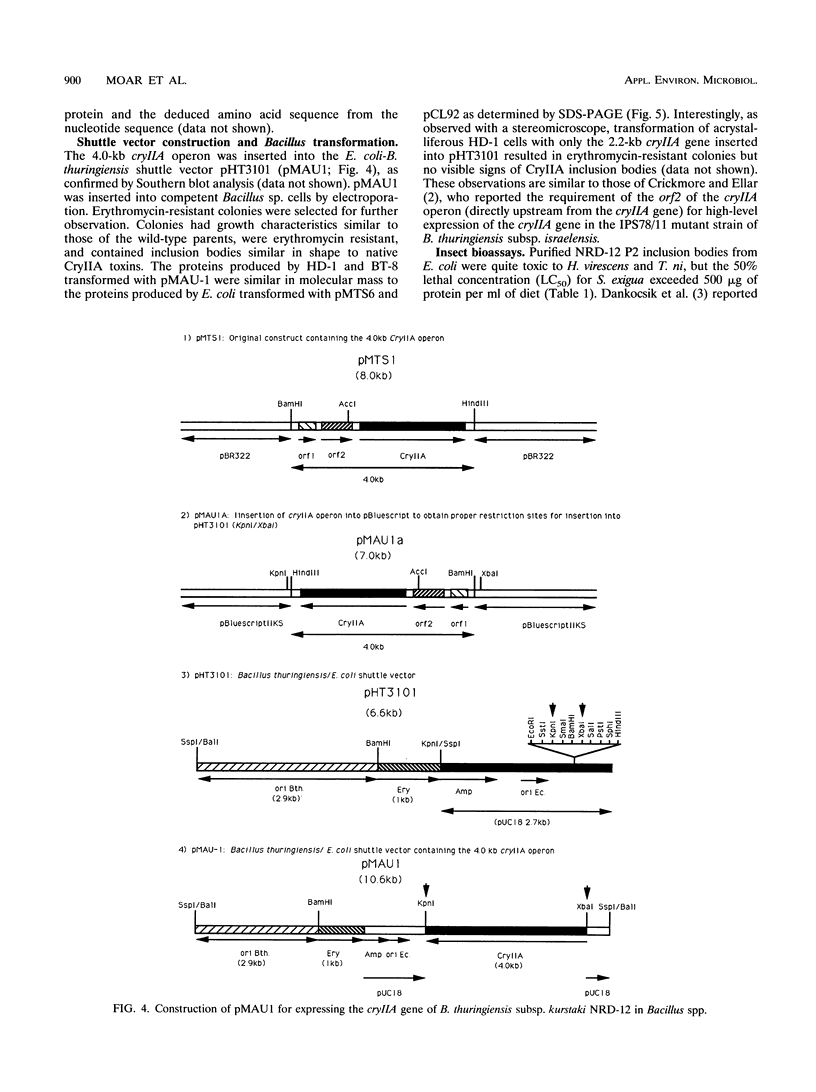
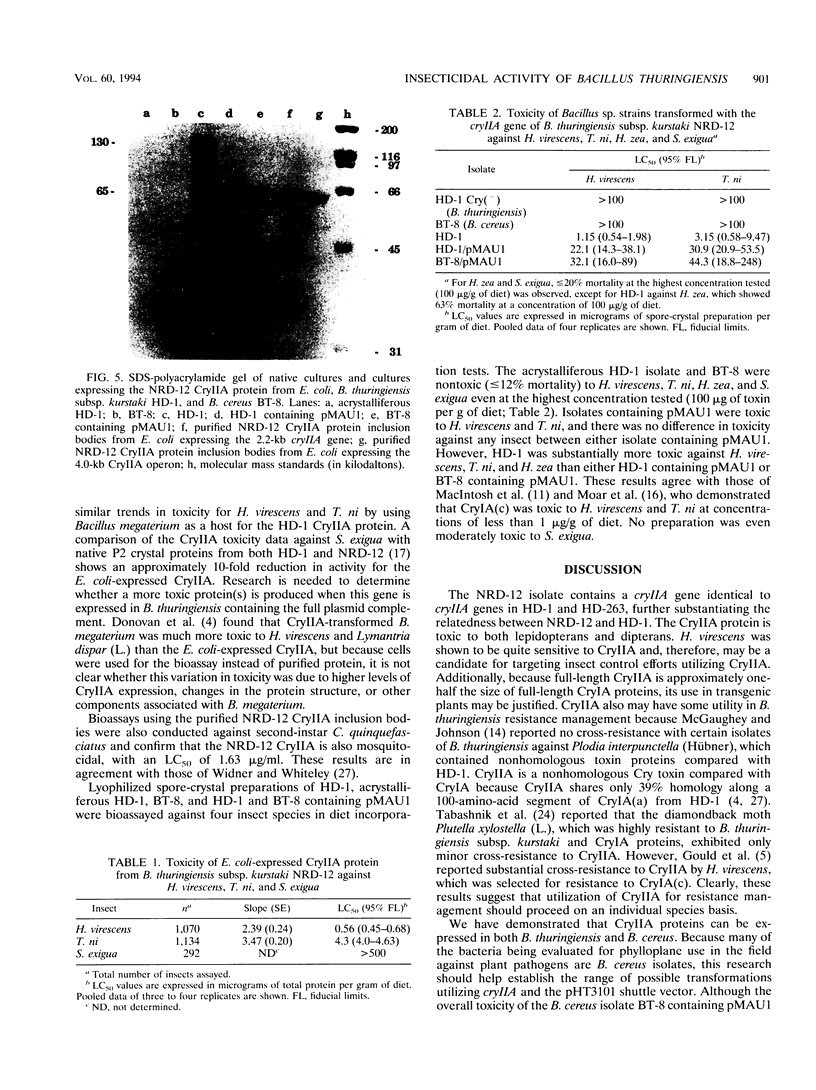
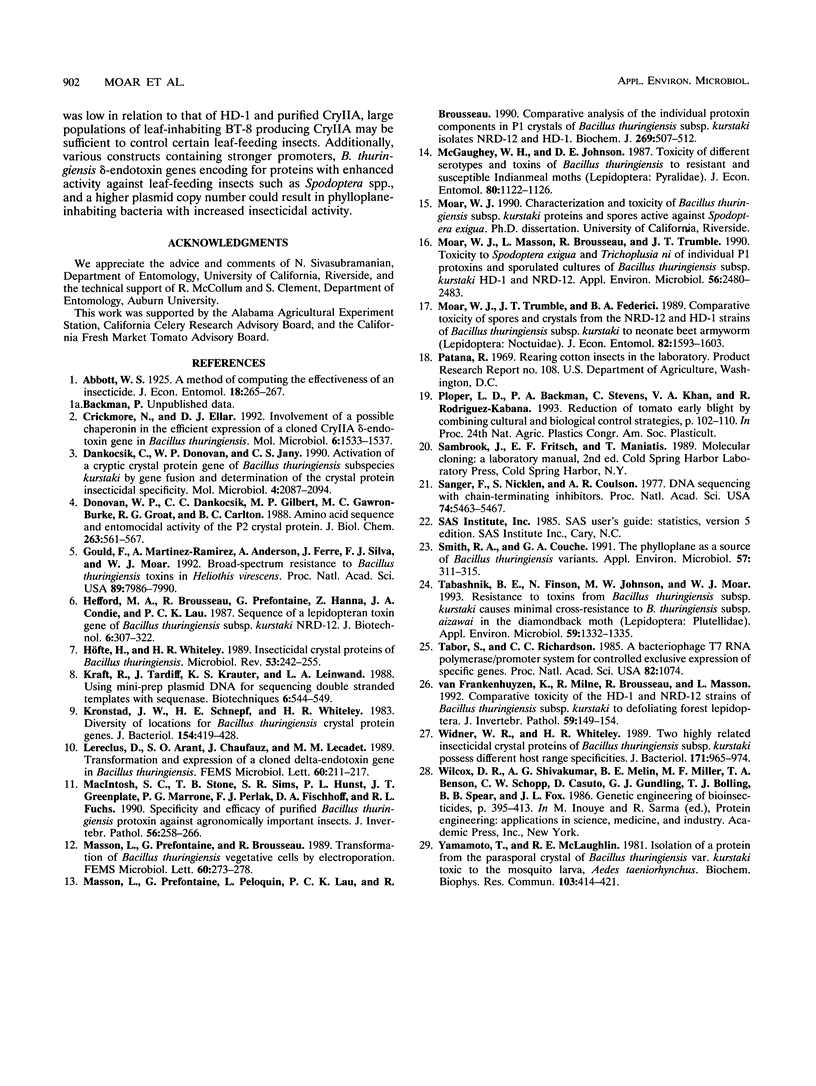
Images in this article
Selected References
These references are in PubMed. This may not be the complete list of references from this article.
- Crickmore N., Ellar D. J. Involvement of a possible chaperonin in the efficient expression of a cloned CryIIA delta-endotoxin gene in Bacillus thuringiensis. Mol Microbiol. 1992 Jun;6(11):1533–1537. doi: 10.1111/j.1365-2958.1992.tb00874.x. [DOI] [PubMed] [Google Scholar]
- Dankocsik C., Donovan W. P., Jany C. S. Activation of a cryptic crystal protein gene of Bacillus thuringiensis subspecies kurstaki by gene fusion and determination of the crystal protein insecticidal specificity. Mol Microbiol. 1990 Dec;4(12):2087–2094. doi: 10.1111/j.1365-2958.1990.tb00569.x. [DOI] [PubMed] [Google Scholar]
- Donovan W. P., Dankocsik C. C., Gilbert M. P., Gawron-Burke M. C., Groat R. G., Carlton B. C. Amino acid sequence and entomocidal activity of the P2 crystal protein. An insect toxin from Bacillus thuringiensis var. kurstaki. J Biol Chem. 1988 Jan 5;263(1):561–567. [PubMed] [Google Scholar]
- Gould F., Martinez-Ramirez A., Anderson A., Ferre J., Silva F. J., Moar W. J. Broad-spectrum resistance to Bacillus thuringiensis toxins in Heliothis virescens. Proc Natl Acad Sci U S A. 1992 Sep 1;89(17):7986–7990. doi: 10.1073/pnas.89.17.7986. [DOI] [PMC free article] [PubMed] [Google Scholar]
- Höfte H., Whiteley H. R. Insecticidal crystal proteins of Bacillus thuringiensis. Microbiol Rev. 1989 Jun;53(2):242–255. doi: 10.1128/mr.53.2.242-255.1989. [DOI] [PMC free article] [PubMed] [Google Scholar]
- Kraft R., Tardiff J., Krauter K. S., Leinwand L. A. Using mini-prep plasmid DNA for sequencing double stranded templates with Sequenase. Biotechniques. 1988 Jun;6(6):544-6, 549. [PubMed] [Google Scholar]
- Kronstad J. W., Schnepf H. E., Whiteley H. R. Diversity of locations for Bacillus thuringiensis crystal protein genes. J Bacteriol. 1983 Apr;154(1):419–428. doi: 10.1128/jb.154.1.419-428.1983. [DOI] [PMC free article] [PubMed] [Google Scholar]
- Lereclus D., Arantès O., Chaufaux J., Lecadet M. Transformation and expression of a cloned delta-endotoxin gene in Bacillus thuringiensis. FEMS Microbiol Lett. 1989 Jul 15;51(1):211–217. doi: 10.1016/0378-1097(89)90511-9. [DOI] [PubMed] [Google Scholar]
- MacIntosh S. C., Stone T. B., Sims S. R., Hunst P. L., Greenplate J. T., Marrone P. G., Perlak F. J., Fischhoff D. A., Fuchs R. L. Specificity and efficacy of purified Bacillus thuringiensis proteins against agronomically important insects. J Invertebr Pathol. 1990 Sep;56(2):258–266. doi: 10.1016/0022-2011(90)90109-j. [DOI] [PubMed] [Google Scholar]
- Masson L., Préfontaine G., Brousseau R. Transformation of Bacillus thuringiensis vegetative cells by electroporation. FEMS Microbiol Lett. 1989 Aug;51(3):273–277. doi: 10.1016/0378-1097(89)90409-6. [DOI] [PubMed] [Google Scholar]
- Masson L., Préfontaine G., Péloquin L., Lau P. C., Brousseau R. Comparative analysis of the individual protoxin components in P1 crystals of Bacillus thuringiensis subsp. kurstaki isolates NRD-12 and HD-1. Biochem J. 1990 Jul 15;269(2):507–512. doi: 10.1042/bj2690507. [DOI] [PMC free article] [PubMed] [Google Scholar]
- Moar W. J., Masson L., Brousseau R., Trumble J. T. Toxicity to Spodoptera exigua and Trichoplusia ni of individual P1 protoxins and sporulated cultures of Bacillus thuringiensis subsp. kurstaki HD-1 and NRD-12. Appl Environ Microbiol. 1990 Aug;56(8):2480–2483. doi: 10.1128/aem.56.8.2480-2483.1990. [DOI] [PMC free article] [PubMed] [Google Scholar]
- Sanger F., Nicklen S., Coulson A. R. DNA sequencing with chain-terminating inhibitors. Proc Natl Acad Sci U S A. 1977 Dec;74(12):5463–5467. doi: 10.1073/pnas.74.12.5463. [DOI] [PMC free article] [PubMed] [Google Scholar]
- Smith R. A., Couche G. A. The Phylloplane as a Source of Bacillus thuringiensis Variants. Appl Environ Microbiol. 1991 Jan;57(1):311–315. doi: 10.1128/aem.57.1.311-315.1991. [DOI] [PMC free article] [PubMed] [Google Scholar]
- Tabashnik B. E., Finson N., Johnson M. W., Moar W. J. Resistance to Toxins from Bacillus thuringiensis subsp. kurstaki Causes Minimal Cross-Resistance to B. thuringiensis subsp. aizawai in the Diamondback Moth (Lepidoptera: Plutellidae). Appl Environ Microbiol. 1993 May;59(5):1332–1335. doi: 10.1128/aem.59.5.1332-1335.1993. [DOI] [PMC free article] [PubMed] [Google Scholar]
- Tabor S., Richardson C. C. A bacteriophage T7 RNA polymerase/promoter system for controlled exclusive expression of specific genes. Proc Natl Acad Sci U S A. 1985 Feb;82(4):1074–1078. doi: 10.1073/pnas.82.4.1074. [DOI] [PMC free article] [PubMed] [Google Scholar]
- Widner W. R., Whiteley H. R. Two highly related insecticidal crystal proteins of Bacillus thuringiensis subsp. kurstaki possess different host range specificities. J Bacteriol. 1989 Feb;171(2):965–974. doi: 10.1128/jb.171.2.965-974.1989. [DOI] [PMC free article] [PubMed] [Google Scholar]
- Yamamoto T., McLaughlin R. E. Isolation of a protein from the parasporal crystal of Bacillus thuringiensis var. Kurstaki toxic to the mosquito larva, Aedes taeniorhynchus. Biochem Biophys Res Commun. 1981 Nov 30;103(2):414–421. doi: 10.1016/0006-291x(81)90468-x. [DOI] [PubMed] [Google Scholar]
- van Frankenhuyzen K., Milne R., Brousseau R., Masson L. Comparative toxicity of the HD-1 and NRD-12 strains of Bacillus thuringiensis subsp. kurstaki to defoliating forest Lepidoptera. J Invertebr Pathol. 1992 Mar;59(2):149–154. doi: 10.1016/0022-2011(92)90025-y. [DOI] [PubMed] [Google Scholar]



